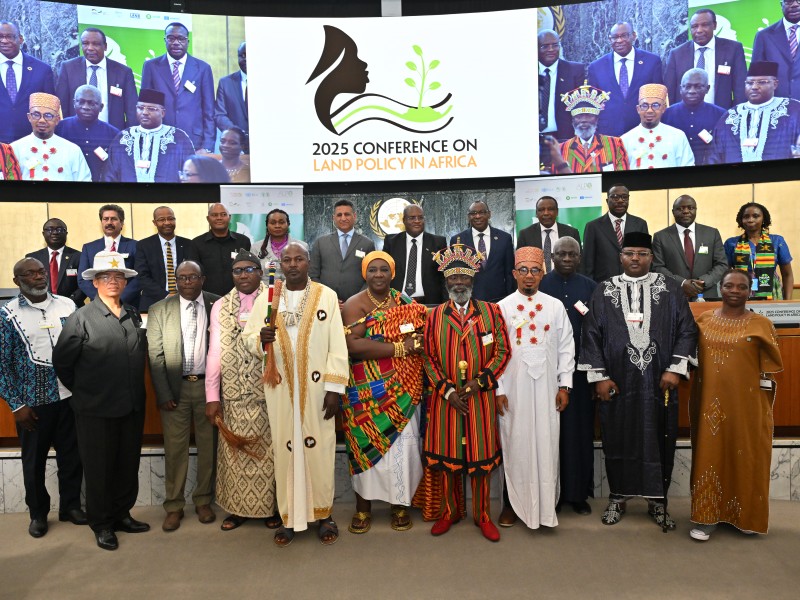Addis Ababa, Ethiopia, 10 November 2025 (ECA) – In a venue steeped in the history of Pan-African liberation, the sixth Conference on Land Policy in Africa (CLPA) opened on Monday, 10 November with calls to address centuries of land dispossession through systemic reform and a bold, forward-looking agenda for reparatory justice.
Held in the Africa Hall of the UN Economic Commission for Africa (ECA)—the birthplace of the Organization of African Unity—the 2025 conference, themed “Land Governance, Justice and Reparations for Africans and Descendants of People of the African Diaspora,” directly aligns with the African Union’s theme of the year, signaling growing continental commitment to tackling historical wounds and their modern-day consequences.
Speakers framed land not as a mere technical or economic asset, but as the foundational bedrock for sovereignty, dignity, and restorative justice.
Mr. Claver Gatete, Executive Secretary of the ECA, set the tone by linking Africa’s current land challenges to broader global injustices. He warned that the continent continues to bear “the heaviest burden from rising debt, climate-induced displacement and persistent inequalities,” a condition rooted in “centuries of enslavement, colonization and dispossession.”
Highlighting a stark paradox—that Africa holds 30% of the world’s mineral resources and 65% of its uncultivated arable land, yet contributes a mere 2% to global manufacturing—Mr. Gatete labeled this imbalance “the enduring legacy of structural inequities.”
He framed reparations as a transformative, future-oriented project. “Reparations must go beyond acknowledgement of the past. They must transform the systems that perpetuate inequality today,” he stated, outlining a five-pillar action plan. This includes reforming the global financial architecture, strengthening land tenure security, leveraging the African Continental Free Trade Area (AfCFTA), mobilizing the diaspora, and investing in technology and youth.
Ambassador Amr Aljowaily, Director of the AU’s Citizens and Diaspora Organizations Directorate (CIDO), for his part, declared land the “very architecture of social justice.” He articulated a vision of justice as restoration: “the restoration of agency, dignity, and the right of Africans to define their own developmental destiny.”
Amb. Aljowaily detailed the AU’s reparations agenda. He highlighted Decision 934, which classifies the transatlantic slave trade, colonialism, and genocide as crimes against humanity, and announced the establishment of the first AU Committee on Reparations and a Group of Legal Experts, both set to convene next month.
He also revealed a major milestone: “For the very first time, the United Nations Permanent Forum on People of African Descent will convene in Addis Ababa in April 2026,” as part of a growing partnership with CARICOM and a resurgent and institutionalized global movement.
The opening ceremony featured a raw and emotional spoken word performance by artist, Prisca, also known as SCAR. Her piece captured the generational trauma of colonization and cultural erasure, challenging historical narratives that minimize African dispossession. Her evocative refrain—“The soil still bleeds where the borders were drawn”—resonated deeply with the audience, serving as a potent metaphor for the CLPA’s theme on land, governance, justice and reparations.
The keynote address was delivered by Mzwanele Nyhontso, South Africa’s Minister of Land Reform and Rural Development. Rooting his nation’s efforts in its constitutional mandate, he provided a comprehensive overview of legislative reforms, including the Equitable Access to Land Bill and the Communal Land Tenure Bill, aimed at securing rights for millions.
While citing achievements since 1994—including the redistribution of 5.9 million hectares—Minister Nyhontso was candid about “modest” progress and persistent challenges like insufficient funding and slow tenure reform. “We cannot over-emphasize the imperative of providing adequate investment… Otherwise, we should brace ourselves for a protracted period during which the promise of our constitutions will be postponed indefinitely,” he cautioned.
Aligning squarely with the conference theme, he addressed global reparations directly. “Land dispossession is a clear example of colonial excesses… Those who viciously took land away from our Indigenous peoples have a responsibility to atone and pay,” he stated, asserting that “the primary act of national reparation is the comprehensive restoration of land.”
He concluded with a rousing Pan-African call to unity, quoting Ghana’s first president, Kwame Nkrumah: “We must unite now or perish. Divided, Africa is weak; united, it could become one of the greatest forces for good in the world.”
The opening ceremony was attended by over 400 participants representing traditional authorities, African diaspora, government, media, civil society and academia and development organizations and partners.
CLPA2025 Event site and more info:
https://www.uneca.org/eca-events/clpa2025
Watch the recordings here: CLPA 2025 PLAYLIST:
https://www.youtube.com/playlist?list=PLcfKplk33JTjxHT6OqrrJjhcpN5I9cqmd
CLPA 2025 In photos:
https://www.flickr.com/photos/uneca/collections/72157724375821106/
Issued by:
Communications Section
Economic Commission for Africa
PO Box 3001
Addis Ababa
Ethiopia
Tel: +251 11 551 5826
E-mail: eca-info@un.org
